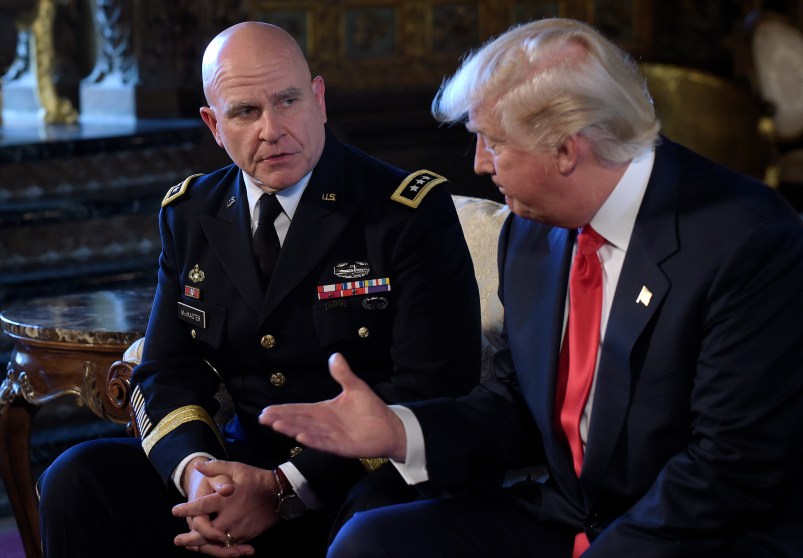Newly named national security adviser and Lt. Gen. H.R. McMaster is waging an uphill battle to push President Donald Trump and his senior aides to stop using the phrase “radical Islamic terrorism,” according to a pair of recent reports.
An anonymous White House official who attended an all-staff National Security Council meeting last week told CNN that McMaster said the language was unhelpful in combating groups like the Islamic State, and that it undermines U.S. alliances with Middle Eastern nations.
Yet Politico reported Tuesday that the President still intends to include it in his speech to a join session of Congress, citing an anonymous white House source. That suggests McMaster, who has been in his position for just one week, has a ways to go in convincing the administration to tone down its rhetoric.
The rest of Trump’s inner circle on national security, including chief strategist Steve Bannon, senior policy adviser and chief speechwriter Stephen Miller and deputy assistant Sebastian Gorka see the phrase “radical Islamic terrorism” as an essential tool in the fight against ISIL.
That split sets up a clash for influence on the issue between the McMaster-led NSC and Bannon’s internal think tank known as the Strategic Initiatives Group, which is reportedly intended to focus on long-term planning.
In his 2016 book “Defeating Jihad,” Gorka, a member of the SIG, argues that the U.S. must name the “enemy” to crush the ideology of “global jihadism.” He returned to this theme during a speech last week at the Conservative Political Action Conference, in which he argued, as he’s done before, that Trump’s August campaign speech in Youngstown, Ohio, “Understanding the Threat: Radical Islam and the Age of Terror,” is the defining text of the administration’s approach to foreign policy.
McMaster’s predecessor, retired Lt. Gen. Michael Flynn, who was ousted from the post after only three weeks on the job, went even further with his rhetoric, once calling Islam itself a “vicious cancer inside the body of 1.7 billion people.”
McMaster’s view that such rhetoric bolsters ISIL’s claim of a grand clash between East and West has support from counterterrorism experts from across the ideological spectrum.
“We certainly don’t have any analysis that points to what is effectively an issue of semantics being a significant part of why it’s been so difficult to defeat the Islamic State,” Chris Chivvis, foreign policy expert at the RAND Corporation, previously told TPM.
“A phrase is a phrase,” Shadi Hamid, a senior fellow at the Brookings Institute, told TPM in a recent interview. “What’s never been made clear by the Trump administration or people who share this view is how does using phrases like ‘radical Islamic terrorism’ actually translate into policy. How does using these magic words actually make a difference?”







Not a good start. Doesn’t know his place.
I give him 6 months, tops. When it sinks in that he really does work for Steve Bannon.
It will be interesting to see the turnover of this admin at the 12 month mark.
I wouldn’t be surprised to see the retired generals (McMaster, Mattis, Kelley, who am I missing?) ban together and threaten resignation enmass at some point to avert a crises.
Wow. Too intellectual, too Obama-like. And waaaaaay over Donnie’s head. Besides, his beloved deplorables won’t like it.
It separates the extremist mooslims …(bad) …
from the extremist evangelical christians … (good) —
Do words like this matter? Of course they do. When I read this I remembered when World Heavyweight Boxing Champion Muhammad Ali responded to the remark that he was going to be drafted and sent to fight in Viet Nam. He said, “I ain’t got no quarrel with them Viet Cong”. I am convinced the statement from this great man was one of the remarks that started the country thinking a different way about the war in southeast Asia. It alone didn’t make the difference, but it helped re-shape the narrative.
When he realizes that saying the words creates a force field that defeats terrorism, he’ll change his mind. No label, no victory.